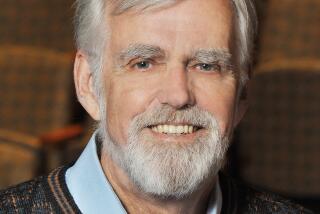Theater : South Coast ‘Hedda Gabler’ Takes On Mythic Quality
- Share via
COSTA MESA — Henrik Ibsen’s “Hedda Gabler” has the reputation of an acquired taste. Devoted playgoers should find South Coast Repertory’s new revival a reacquired taste, depending on their tolerance for its moody embrace of the appalling, self-destructive Hedda.
A brief but atmospheric prelude to the drama, glimpsed in the pale half-light of dawn, sets the histrionic tone of what is to come. It also wastes no time deploying the key visual technique for suggesting the production’s mythic dimension: huge slide projections of surreal motifs tied to Hedda’s inner turmoil.
Director David Chambers has Hedda emerge from the shadows like an insomniac ghost, while the faint ticking of an unseen clock fades into silence. She circles the stage and strikes a match to light a cigarette. The match glows, then goes out. Suddenly the walls behind her are emblazoned with two towering images of flame, portending her demonic nature and her fate.
Even without such emblematic eruptions, there is never any mistake that Lynnda Ferguson’s Hedda is a nasty piece of work. In the Mainstage production that opened Friday, she is willful, selfish, calculating, temperamental and, above all, miserably bored.
“I have a talent for only one thing in the world--to bore myself to death,” Hedda admits to Judge Brack (Miguel Perez), an insinuating admirer. Unfortunately, she also has a mammoth talent for lying to herself and others and for manipulating everyone.
Her self-made match with George Tesman (Nicholas Hormann), the prosaic scholar to whom she’s been married for five months, has turned out to be a bad one. Hedda not only finds the tedium of their life together unbearable but her incipient pregnancy repellent. Both feed her simmering frustrations.
Meanwhile, she is made jealous by the unexpected appearance on the scene of a former lover, Eilert Lovborg (Bruce Abbott), and his devoted soul mate, Thea Elvsted (Bari Hochwald).
Looking as predatory and imposing as a black widow, especially in the sweeping gown designed for her grand entrance, the elegant Hedda condescends to all within reach of her silken web.
It soon becomes apparent that she’s capable of killing brutally, with or without her famous pistols. She wields the sort of malignant power one associates with Lady Macbeth.
For all its doom, however, this striking “Hedda Gabler” is not a gloomy production.
Ferguson carries off the title role with a commanding swagger and a lightness of touch, even while communicating the repressed hysteria just below the surface of Hedda’s brooding personality.
She conveys Hedda’s sardonic humor with an engaging sense of mockery, lending an entertaining resonance to her icy put-downs. When Hedda belittles her husband, who worships the ground she walks on, she seems hateful yet somehow amusing.
*
Hormann, for his part, makes George far more plausible than usual. Though he is still a provincial milquetoast hard to credit with a catch such as Hedda--she is, after all, the desirable daughter of an aristocratic general--George doesn’t appear to be so dimwitted as to make their marriage seem inconceivable.
Perhaps more remarkable, Hormann manages to capture the spirit of perpetual dullness with more inflections for “Eh?”--George’s frequently repeated phrase--than Ibsen probably ever dreamed of. A new English translation, worked up for this production by the director, also helps brings a broad hint of infantilism to the character: George keeps referring to his Aunt Julia as “Auntie Jujie.”
On opening night Perez stood out for his portrayal of the oily Judge Brack. Hochwald gave a mildly affecting performance as Thea, the mouse with the courage to roar. And Abbott was intermittently persuasive as Lovborg, the tempestuous genius who falls off the wagon. Oceana Marr was a bit too wooden, however, even for Aunt Julia.
What sets this “Hedda Gabler” apart is the production’s spectacular look and the unifying aim of the physical design.
The massive walls of the Tesman villa are skewed to invoke the idea of an ancient fortress. The black-and-white projections of equestrian statues and female torsos, among the other emblems of Hedda’s psychic makeup, reinforce the notion of classical antiquity. And Shigeru Yaji’s stunning costumes embroider on the mythical element whenever they can.
The odd thing is that the play’s final offstage gunshot has so little dramatic impact. The way it has been staged, without any effective buildup, it seems no more than an afterthought.
Perhaps that shot, too, needs a visual analogue to make its catastrophic point.
* “Hedda Gabler,” South Coast Repertory, 655 Town Center Drive, Costa Mesa. Tuesdays-Fridays, 8 p.m.; Saturdays, 2:30 and 8 p.m.; Sundays, 2:30 and 7:30 p.m. Ends Feb. 13. $25-$35. (714) 957-4033. Running time: 2 hours, 30 minutes. Oceana Marr: Aunt Julia Tesman
Marnie Crossen: Berte, the housekeeper
Nicholas Hormann: George Tesman
Lynnda Ferguson: Hedda Gabler
Bari Hochwald: Thea Elvsted
Miguel Perez: Judge Brack
Bruce Abbott: Eilert Lovborg
A South Coast Repertory production of Henrik Ibsen’s play. Directed by David Chambers. A new translation by Chambers (with Anne-Charlotte Harvey). Scenic designer: Ralph Funicello. Costume designer: Shigeru Yaji. Lighting designer: Ashley York Kennedy. Sound designer: Garth Hemphill. Production manager: Michael Mora. Stage manager: Scott Harrison.
More to Read
The biggest entertainment stories
Get our big stories about Hollywood, film, television, music, arts, culture and more right in your inbox as soon as they publish.
You may occasionally receive promotional content from the Los Angeles Times.










